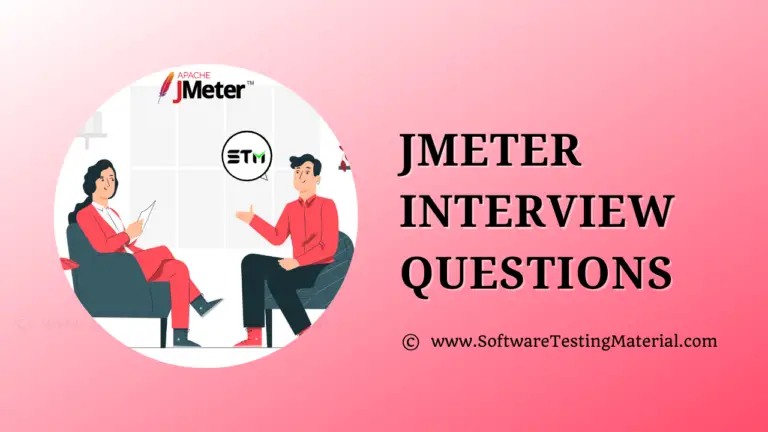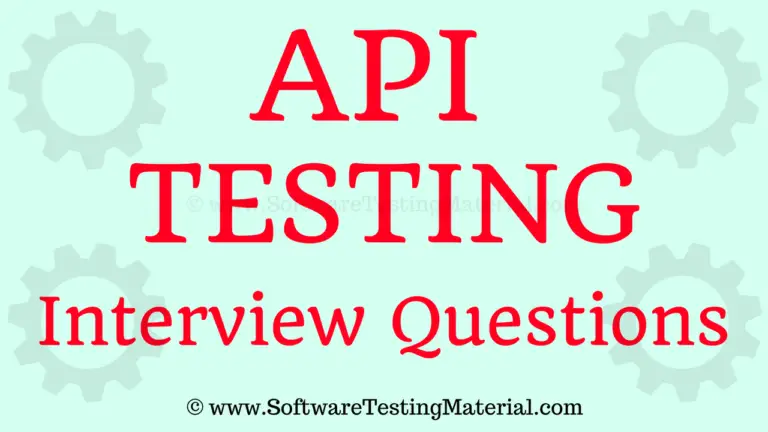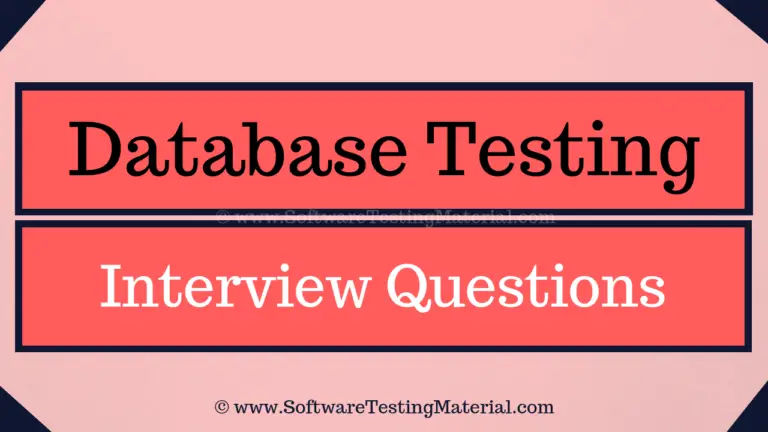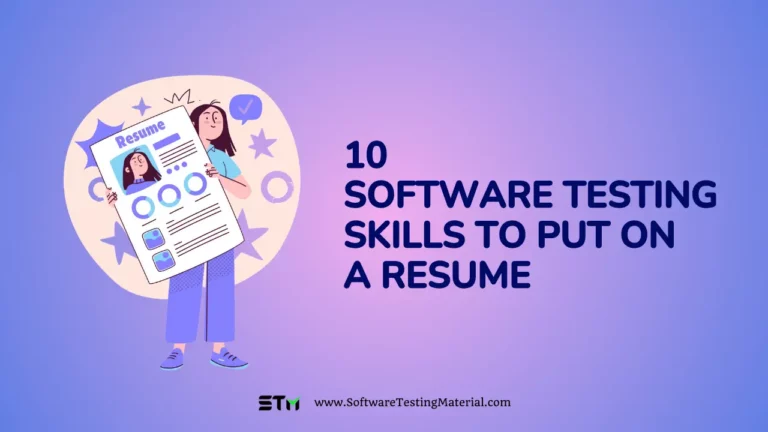Top Software Tester Resume Examples & Writing Guide for 2025 [Download]
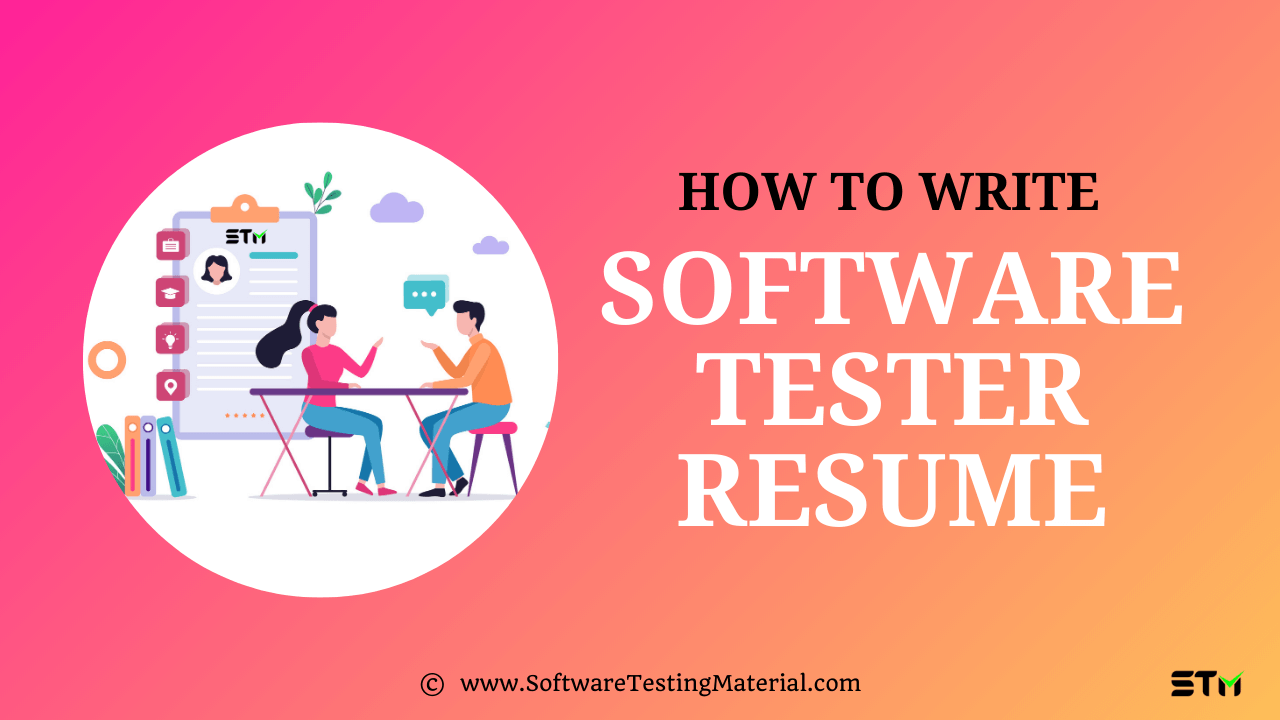
In the competitive world of software testing, your resume is your first opportunity to make a strong impression.
Whether you’re an experienced QA professional or just starting your career in software testing, crafting a resume that stands out is crucial, your resume is your first chance to make a lasting impression.
It’s not just a document listing your qualifications; it’s a strategic marketing tool that can set you apart in a competitive job market.
This comprehensive guide will walk you through the essential elements of crafting a standout software tester resume. We’ll explore:
Whether you specialize in manual testing, automation, or a combination of both, we’ll provide insights on how to present your unique value proposition to potential employers.
From structuring your resume for maximum impact to incorporating the right keywords for Applicant Tracking Systems (ATS), this article will equip you with the knowledge to create a resume that not only passes the initial screening but also impresses hiring managers.
Remember, a well-crafted resume is your ticket to securing that coveted interview.
So, let’s dive in and learn how to create a software tester resume that truly shines in the world of Quality Assurance.
Key Components of a Software Tester Resume
When crafting a software tester resume, it’s crucial to highlight the key components that can set you apart from other candidates.
A well-structured resume not only showcases your skills and experience but also aligns with the expectations of hiring managers in the tech industry.
Below are the essential elements to include:
#1. Personal Information/Contact Information
Your personal information is the first section of your resume and is vital for potential employers to contact you.
This section should include your full name, phone number, email address, and location (city and state), LinkedIn Profile, Personal Website (If any).
Keep this information clear and easy to find at the top of your resume to make it simple for hiring managers to reach out to you.
Tips:
- Make sure your email sounds professional; using a simple format like firstname.lastname@example.com works best.
- If you’re on LinkedIn or have a personal website that showcases your work, feel free to include those links as well.
Example:
Format:
Full Name
Phone Number
Email Address
Location
LinkedIn Profile
Personal Website
Example:
Rajkumar SM
(00) 00000000
hello@softwaretestingmaterial.com
San Francisco, CA
https://www.linkedin.com/company/softwaretestingmaterial/
softwaretestingmaterial.comMake sure all this information is easy to read and positioned at the top of your resume. This helps employers quickly find how to contact you.
#2. Professional Resume Summary or Objective Statement
A professional resume summary or objective statement is important as it gives employers a quick overview of who you are and what you can bring to the table.
The summary is typically a few sentences that highlight your skills, experience, and career goals.
It should focus on your most impressive achievements, such as specific projects you’ve worked on or notable skills in testing software.
On the other hand, an objective statement is a brief statement that outlines your professional aspirations and what you hope to achieve in the role you are applying for.
Remember to keep it concise and tailored to the job you’re applying for, as this can grab the hiring manager’s attention and set the tone for the rest of your resume.
Must Read: 100+ Professional Resume Summary Examples for Software Testers
Example:
Professional summary for experienced
Professional Summary: A results-driven software tester with over five years of experience in improving product quality. Known for identifying bugs and ensuring quality assurance. Seeking to leverage my skills to help improve software performance at Tech Solutions Inc.
Professional Summary: Experienced project manager with a strong background in leading cross-functional teams. I have successfully delivered over ten projects on time and within budget. I am looking to bring my expertise to enhance operations at Innovative Corp.
Objective statement for entry level positions
Objective Statement: A motivated recent graduate looking for an entry-level marketing position. I want to apply my creativity and analytical skills to contribute to brand growth and engage customers effectively.
Objective Statement: Motivated and detail-oriented recent graduate seeking an entry-level software tester position. Committed to learning and growing within a collaborative team environment, aiming to contribute to effective testing processes and enhance user experience.#3. Skills – Technical Skills & Soft Skills
The skills section of your resume is essential for showcasing what you bring to a software testing role.
Start by listing your technical skills, which include specific tools and technologies used in testing.
For example, you might mention proficiency in UI automation by using automated testing tools like Selenium or Cypress, knowledge of programming languages like Java or Python, and familiarity with testing frameworks.
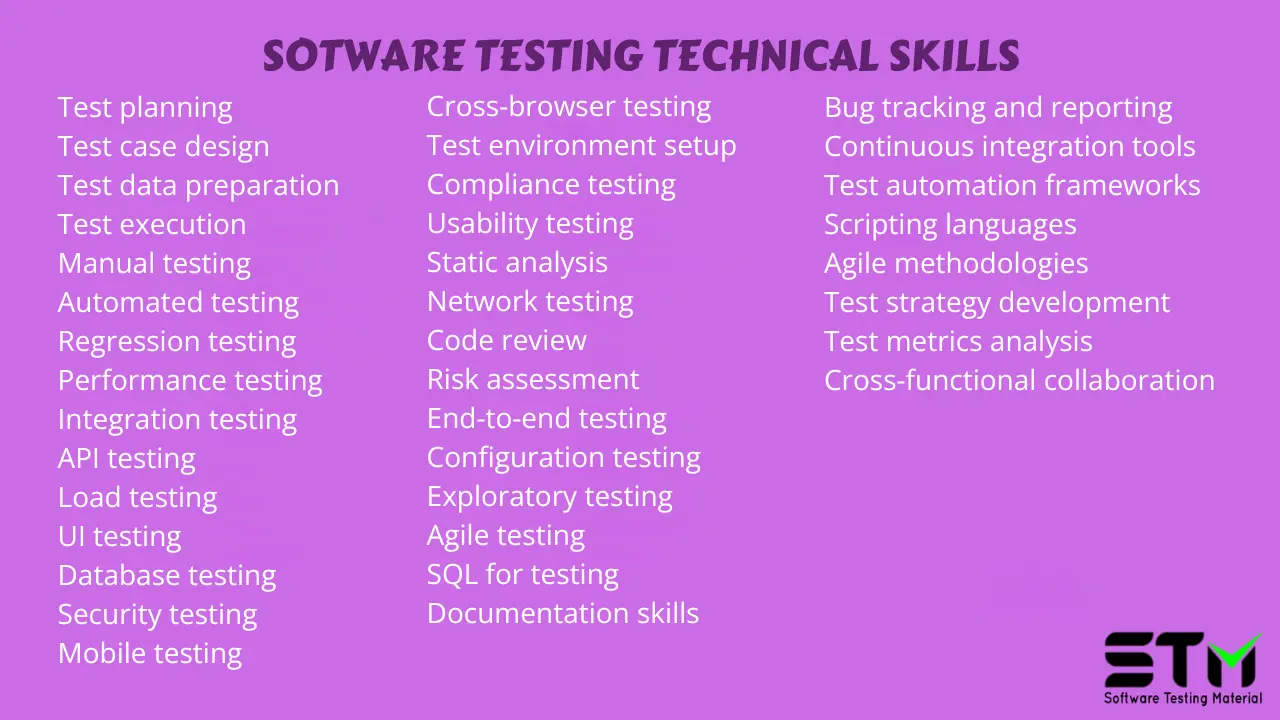
These skills are crucial as they show your capability in executing testing tasks effectively.
In addition to technical skills, don’t forget to highlight your soft skills. These are personal attributes that help you work well with others and handle challenges.
For a software tester, strong attention to detail is vital, as it ensures you catch issues that could affect product quality.
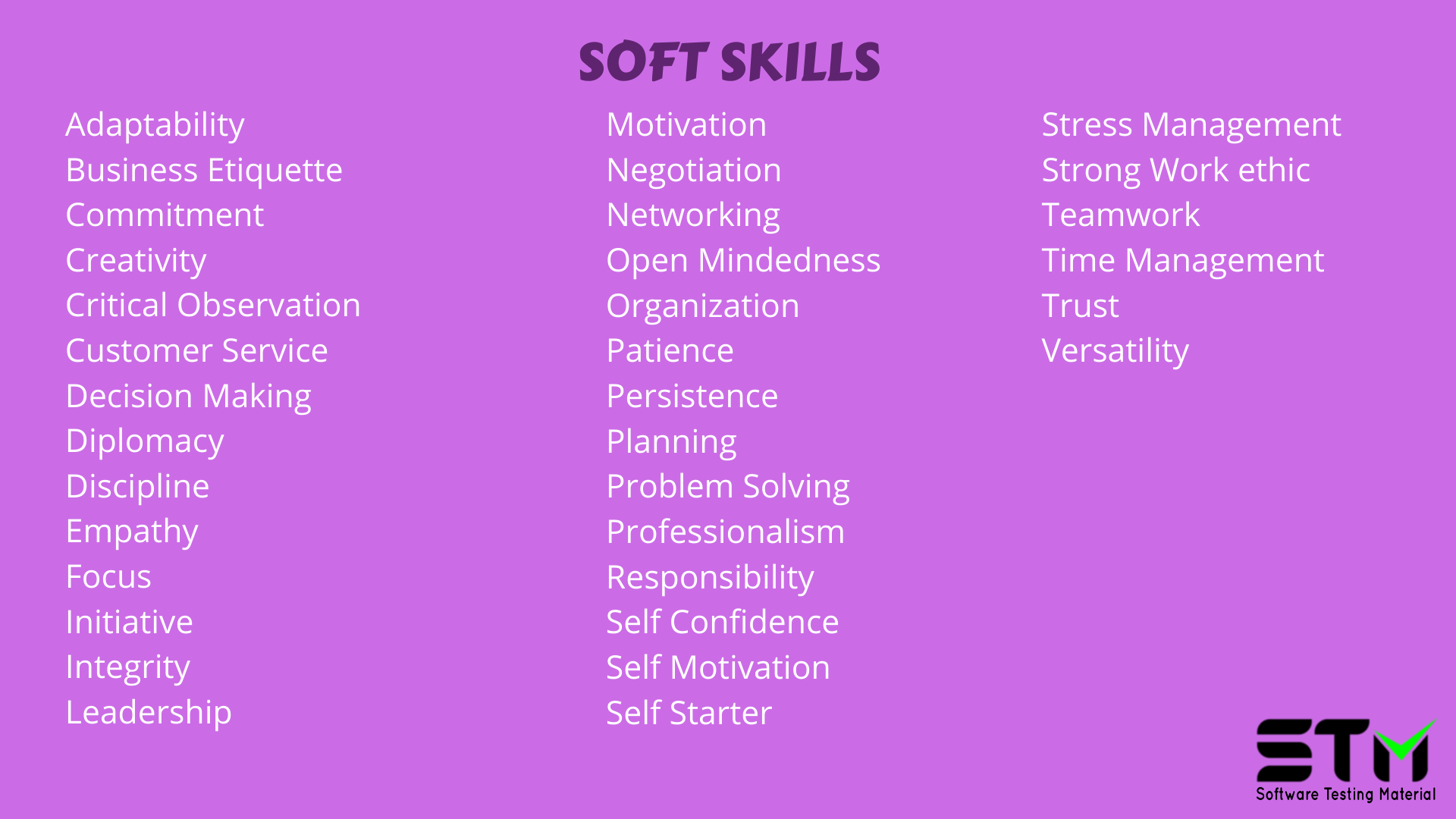
Communication skills are also important, as you’ll need to share your findings with developers and other team members clearly.
Finally, problem-solving abilities are crucial for diagnosing issues and devising solutions. A balance of both technical and soft skills will make your resume stand out to employers.
Must Read: 10 Essential Software Testing Skills To Put On A Resume
Example:
Technical Skills:
Automated Testing Tools: I can use tools like Selenium to test software automatically, which saves time and makes testing more efficient.
Programming Languages: I know how to write code in Java and Python, which helps me understand how the software works and to test it effectively.
Testing Frameworks: I am familiar with testing frameworks like JUnit, which help organize and run tests easily.
Soft Skills:
Attention to Detail: I make sure to carefully check every part of the software so I can find any mistakes before it gets released.
Communication Skills: I can explain my testing results clearly, so everyone on the team understands what issues need to be fixed.
Problem-Solving Abilities: When I find a problem, I think of different ways to fix it and choose the best solution. These examples illustrate how both technical and soft skills are crucial for a successful career in software testing.
#4. Work Experience (and Achievements)
When writing the work experience section of your software tester resume, focus on highlighting your relevant job roles and the specific responsibilities you had.
Start with your most recent job and work backward.
For each role, include the job title, the name of the company, and the dates you worked there. Use bullet points to list your main duties and achievements.
Be sure to describe any testing projects you worked on, such as the types of software you tested and the methods you used.
Mention any tools you utilized, like bug tracking software or automated testing tools.
Don’t forget to highlight any significant outcomes, such as improving product quality, reducing testing time, or identifying critical bugs.
Tailor this section to show how your past experiences make you a good fit for the job you are applying for.
Tips:
- Use Bullet Points: Break down your responsibilities and achievements into clear bullet points for easy reading.
- Start with Action Verbs: Begin each bullet point with strong action verbs like “Developed,” “Executed,” or “Improved” to convey impact.
- Quantify Your Achievements: Whenever possible, use numbers to highlight your successes, such as “Increased test coverage by 25%.”
- Focus on Results: Showcase how your contributions led to successful outcomes, like reducing defects or improving delivery timelines.
- Tailor for Each Job: Customize your work experience to align with the job description of the position you’re applying for.
- Keep It Relevant: Include only the most relevant roles and responsibilities related to software testing to keep the content focused.
Example:
Job Title: Software Tester
Company: Tech Innovations Inc.
Dates: January 2020 - Present
Responsibilities:
- Tested a mobile application to ensure it worked well on different devices and operating systems.
- Enhanced test coverage from 60% to 85% by introducing new testing frameworks and methodologies, significantly decreasing production bugs.
- Used JIRA to track bugs and report any issues found during testing.
- Collaborated with developers to fix problems, which improved the app's performance.
Job Title: Quality Assurance Intern
Company: Web Services Ltd.
Dates: June 2019 - December 2019
Responsibilities:
- Helped test the company's website for usability and speed.
- Conducted user feedback sessions to gather opinions on the site's features.
- Led a comprehensive testing plan for a major software release, resulting in the identification and resolution of over 150 critical defects prior to deployment.
- Assisted in writing test cases, which made the testing process clearer and more organized.
- These examples show how to present your work experience clearly, making it easy for employers to understand your background and contributions.#5. Education
When it comes to the education section of your software tester resume, start by listing your highest degree first.
Include the degree you earned, the name of the institution, and the date of graduation.
If you hold relevant certifications, such as a Certified Software Tester (CSTE) or other industry-related qualifications, be sure to add those as well.
It’s also helpful to mention any relevant coursework or projects that demonstrate your skills in software testing.
If you participated in workshops, boot camps, or online courses focusing on testing methodologies or tools, consider including those too.
This section shows potential employers that you have the educational background to support your technical knowledge and skills in software testing.
Example:
Bachelor of Science in Computer Science
University of Technology, May 2020
Relevant Coursework: Software Testing, Web Development, Data Structures
Certified Software Tester (CSTE)
International Institute for Software Testing, August 2021
Online Course: Foundations of Software Testing
Offered by Coursera, Completed September 2020
Boot Camp: Full-Stack Web Development
Coding Academy, March 2019
Projects: Developed a functional website and conducted tests to ensure performance and usability. These examples illustrate how to effectively present your education and certifications, showcasing your qualifications in software testing in a clear and straightforward manner.
#6. Certifications
Certifications can greatly enhance your software tester resume by demonstrating your expertise and commitment to the profession.
Begin this section by listing any relevant certifications you have earned, such as the Certified Software Tester (CSTE) or ISTQB (International Software Testing Qualifications Board) certification.
Include the name of the certification, the organization that awarded it, and the date you obtained it.
Having these certifications shows employers that you are knowledgeable about industry standards and practices.
If you’ve completed any additional training or workshops related to software testing techniques or tools, mention those as well.
Certifications can set you apart from other candidates and give you a competitive edge in the job market.
Example:
ISTQB Certified Tester
This is a well-known certification in the software testing field. You can earn it by passing an exam that shows you understand testing principles.
CSTE Certification
The Certified Software Tester (CSTE) certification proves you have the skills needed for software testing. You must have relevant work experience and pass a test to get this certification.
Agile Testing Certification
This certification focuses on testing in Agile projects. It shows you understand how to test software in a fast-paced and flexible work environment.
Automation Testing Certification
If you take this certification, it will show that you can use software tools to automate testing processes. This skill is very valuable as more companies move towards automated testing strategies. These examples demonstrate common certifications that can strengthen your resume and highlight your knowledge in software testing.
#7. Projects (if applicable)
In the Projects section of your software tester resume, you should highlight any relevant projects you have worked on that showcase your skills and experience.
Start by providing a brief description of each project, including its purpose and the technologies used.
Mention your specific role in the project and what testing methods you applied, such as manual testing, automated testing, or performance testing.
If applicable, include any metrics or outcomes that demonstrate the success of the project, such as improved product quality or reduced defect rates.
This section gives employers insight into your practical experience and how you apply your skills in real-world situations.
Example:
E-commerce Website Testing
Purpose: To ensure the website functions smoothly for customers.
Technologies Used: HTML, JavaScript, and MySQL.
Role: I was part of the testing team, focusing on manual testing.
Testing Methods: I performed user interface testing and functionality testing to identify issues.
Outcome: Improved website speed by 30% and reduced customer complaints about bugs.
Mobile App Development
Purpose: To create a user-friendly application for task management.
Technologies Used: React Native and Firebase.
Role: Lead Tester responsible for automated testing.
Testing Methods: I wrote automated scripts to test various app features.
Outcome: Achieved a 95% test coverage which ensured fewer bugs in the final app release.
Software Upgrade Project
Purpose: To upgrade an existing software to a new version with enhanced features.
Technologies Used: Java and SQL Server.
Role: Tester in charge of regression testing.
Testing Methods: Conducted performance testing to ascertain the upgrade did not slow down the software.
Outcome: Successfully confirmed the upgrade met performance targets, leading to a smoother rollout.Tips for Writing Your Software QA Resume
- Use clear contact information: Make it easy for employers to find your information.
- Use a professional email address: Ensure your email address is appropriate and reflects your name or professional identity, avoiding nicknames or unprofessional terms.
- Start with a strong summary: Briefly highlight your skills and experience at the top.
- Focus on relevant experience: List jobs that relate to software testing and quality assurance.
- Highlight your skills: Include both technical and soft skills that are relevant to QA roles.
- Use bullet points: This helps to make your resume easy to read.
- Be specific: Include numbers and examples to show your impact (e.g., “Reduced bug count by 30%”).
- Keep it short: Aim for one page if you have limited experience, two pages if you have more.
- Proofread for errors: Ensure there are no typos or grammatical mistakes.
- Customize for each job: Tailor your resume to match the job description for each application.
Tips for Writing a Software Tester’s Resume with No Experience
If you are a fresher and applying for Software Tester position, follow these tips to make your resume stand out from the crowd.
- Focus on Relevant Skills: Highlight any skills related to software testing, such as attention to detail, analytical thinking, and problem-solving. Even if you don’t have job experience, you may have developed these skills through coursework or personal projects.
- Include Projects: If you’ve worked on any projects—either in school or on your own—include them in your resume. Describe your role and the testing methods you used, even if it was just for practice.
- Emphasize Education: If you have relevant education, such as a degree in computer science or certification in software testing, make sure to list it prominently. Your academic achievements can demonstrate your commitment and basic knowledge of the field.
- Use Keywords: Look at job postings for software testers and note the keywords used in the descriptions. Incorporate these keywords into your resume to help you get noticed by automated systems and hiring managers.
- Tailor Your Resume: Adjust your resume for each application to focus on the skills and experiences that are most relevant to the specific job. This shows hiring managers that you’ve taken the time to consider the position.
- Include Volunteer Experience: If you’ve volunteered in any capacity that included technical skills or teamwork, mention it on your resume. This can help show your willingness to learn and engage with others in a professional setting.
- Keep It Concise: Make your resume easy to read by keeping it to one page. Use clear headings, bullet points, and a simple font to ensure the information is straightforward and accessible.
Download Sample Software QA Resume
- Sample Resume for Software Tester Freshers
- Sample Resume for Software Tester Experienced
- Sample Resume for Selenium Tester Freshers
- Sample Resume for Selenium Tester Experienced
If you are looking for a customized resume, you can contact us. Our team will prepare a resume for you. We charge a very minimal amount for this.
Download the sample software tester resume using the below download link and make modifications as per your requirement.
Frequently Asked Questions
How to write a Software Testing Resume for a Fresher
When writing a resume as a fresher in software testing, focus on your education and any relevant projects. Start with a clear objective statement that explains your career goals. Include your technical skills, such as programming languages and testing tools, even if you learned them in school. Highlight any internships, workshops, or coursework related to software testing. Finally, keep your resume neat and organized, ensuring that it is easy to read and free from errors. This will help you make a good impression on potential employers.
How to write a Software Testing Resume if I have a career gap
If you have a career gap, it’s important to address it positively on your resume. Start by explaining the reason for the gap briefly, such as personal development, education, or family commitments. Highlight any relevant skills or training you acquired during this time. Focus on showcasing your testing skills, certifications, or any freelance or volunteer work you did. You can also use a functional or hybrid resume format to emphasize your abilities over the timeline of your employment. Keep it concise and demonstrate your enthusiasm to re-enter the workforce.
Should I include a resume summary or a career objective?
When deciding between a resume summary and an objective, consider your experience level. A resume summary is ideal if you have relevant experience to highlight your achievements and strengths. On the other hand, an objective is better for those starting their career or changing fields, as it focuses on your goals and how they align with the job you’re applying for. Choose the one that best fits your situation to make a strong impression.
Conclusion
Creating the perfect software tester resume may seem like a daunting task, but with the right approach, it’s entirely achievable.
Remember, your resume is more than just a document—it’s a reflection of your professional journey and aspirations.
By focusing on your key skills, customizing your resume for each job application, and showcasing your most relevant experiences, you can significantly increase your chances of landing interviews and, ultimately, securing the job you want.
Don’t forget to keep your resume updated and aligned with the latest trends in software testing.
A well-crafted resume is your ticket to a successful career in this ever-evolving field. Good luck, and happy job hunting!
You can download sample Software Tester Resume using the download button above.
Related Posts:
- 100+ Professional Resume Summary Examples for Software Testers
- 10 Essential Software Testing Skills To Put On A Resume
- 10 Professional Software Tester Cover Letter Examples to Land QA Jobs
- Tell Me About Yourself
- What are your Strengths
- What are your Weaknesses
- 6 Popular HR Interview Questions
- Freelance Writer @ SoftwareTestingMaterial

